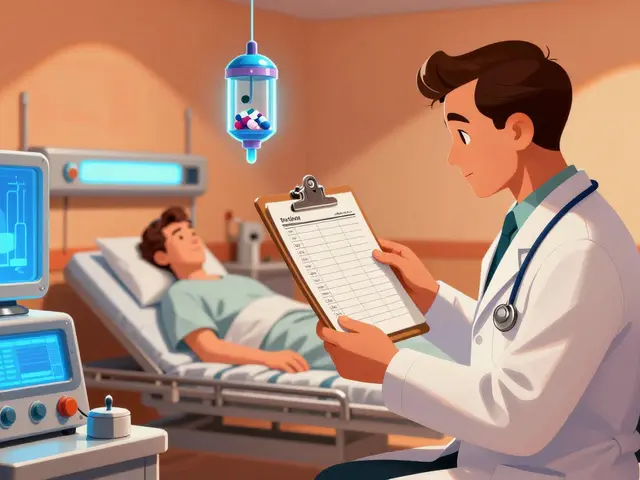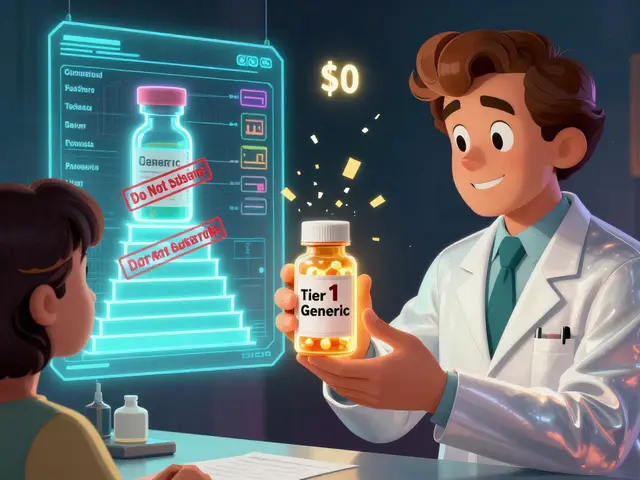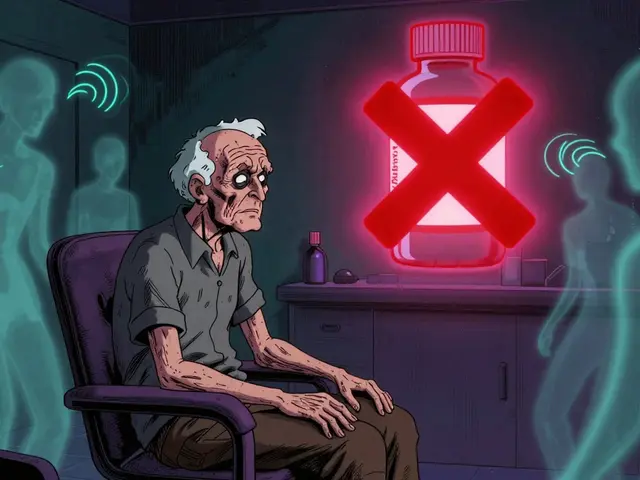If you’ve been prescribed azilsartan for high blood pressure, you might be wondering: can you be allergic to it? It’s not a question most people ask until they or someone they know has a reaction. Azilsartan is a common medicine, but like any drug, it can cause problems for some people - especially if your body reacts badly to it. This isn’t about side effects like dizziness or dry cough. This is about true drug allergies, which can be serious, even life-threatening.
What is azilsartan, really?
Azilsartan is an angiotensin II receptor blocker, or ARB. It works by blocking a hormone called angiotensin II that tightens blood vessels. When that hormone can’t do its job, your blood vessels relax, and your blood pressure drops. It’s often used when other blood pressure meds like lisinopril don’t work well or cause side effects like a persistent cough.
Azilsartan comes in pill form, usually taken once a day. It’s sold under the brand name Edarbi, and generic versions are available too. The typical starting dose is 40 mg per day, though some people need 80 mg. It’s not a quick fix - it takes a few weeks to reach its full effect. Unlike some other ARBs, azilsartan has been shown in clinical trials to lower blood pressure slightly more than valsartan or losartan, which is why doctors sometimes choose it.
Drug allergies vs. side effects - what’s the difference?
This is critical to understand. Most people confuse side effects with allergies. A side effect is something your body doesn’t like but isn’t an immune response. Nausea, fatigue, dizziness, or mild swelling in the ankles? Those are side effects. They’re common, usually harmless, and often go away over time.
An allergy is different. It’s your immune system mistaking the drug for a threat and attacking it. That triggers a cascade of chemicals like histamine, which causes symptoms like:
- Hives or raised, itchy red welts on the skin
- Swelling of the face, lips, tongue, or throat
- Difficulty breathing or wheezing
- Severe rash or blistering skin
- Anaphylaxis - a sudden drop in blood pressure, rapid pulse, loss of consciousness
Anaphylaxis is rare but dangerous. It needs emergency treatment with epinephrine. If you’ve ever had a reaction like this to any medicine, you need to tell your doctor before starting azilsartan.
Has anyone ever had a true allergy to azilsartan?
Yes - but it’s extremely rare. There are only a handful of documented cases in medical journals. One case published in the Journal of Allergy and Clinical Immunology: In Practice in 2022 described a 58-year-old man who developed hives and facial swelling within 30 minutes of taking his first dose of azilsartan. He had no history of drug allergies before. Stopping the drug and giving him antihistamines cleared the reaction. He was later tested with a skin prick test and confirmed to be allergic to azilsartan.
Another case in 2021 involved a woman who developed a severe skin rash after two weeks of taking azilsartan. Biopsy showed drug-induced hypersensitivity syndrome, which is a delayed allergic reaction. She had to stop the drug permanently.
These aren’t common. But they happen. And when they do, they’re not something you can ignore.

Who’s at higher risk?
You’re more likely to have a drug allergy if:
- You’ve had an allergic reaction to another ARB, like losartan, valsartan, or irbesartan
- You’re allergic to sulfa drugs - though azilsartan doesn’t contain sulfa, some people with sulfa allergies react to other drugs in unexpected ways
- You have a history of multiple drug allergies or autoimmune conditions like lupus
- You’ve had angioedema (deep swelling) from ACE inhibitors like lisinopril or enalapril - there’s a small chance you could react to ARBs too
Even if you’ve taken ARBs before without issues, you can still develop an allergy later. Your immune system doesn’t always react the same way twice.
What should you do if you think you’re allergic?
If you notice any signs of an allergic reaction after starting azilsartan, stop taking it immediately. Don’t wait to see if it gets better. Call your doctor or go to the emergency room if you have trouble breathing, swelling in your throat, or feel faint.
Once the reaction is under control, your doctor may refer you to an allergist. They can do skin tests or blood tests to confirm the allergy. They might also test you with other ARBs to see if you’re allergic to the whole class of drugs or just azilsartan.
Important: If you’re confirmed allergic to azilsartan, you should avoid all ARBs unless proven otherwise. There’s cross-reactivity - meaning if you’re allergic to one, you might be allergic to others. Your doctor will switch you to a different class of blood pressure medication, like a calcium channel blocker (amlodipine) or a diuretic (hydrochlorothiazide).
What are your alternatives if you’re allergic to azilsartan?
There are plenty of other options. Here are the most common ones:
| Medication Class | Examples | How It Works |
|---|---|---|
| Calcium Channel Blockers | Amlodipine, diltiazem | Relaxes blood vessels by blocking calcium |
| Diuretics | Hydrochlorothiazide, chlorthalidone | Helps kidneys remove extra salt and water |
| Beta Blockers | Metoprolol, atenolol | Slows heart rate and reduces force of contractions |
| ACE Inhibitors | Lisinopril, enalapril | Blocks angiotensin-converting enzyme - but avoid if you had angioedema before |
Most people respond well to calcium channel blockers or diuretics. They’re effective, safe, and don’t carry the same allergy risk as ARBs. Your doctor will pick based on your age, other health conditions, and how well you tolerate the side effects.

How to stay safe with any blood pressure medication
Even if you’ve never had a reaction, it pays to be cautious:
- Always tell your doctor about every drug allergy you’ve ever had - even if it was years ago
- Keep a written list of all medications you’re allergic to and bring it to every appointment
- Wear a medical alert bracelet if you’ve had a serious reaction before
- Don’t take new medications without checking with your pharmacist - even over-the-counter ones can interact or trigger reactions
- Pay attention to your body in the first few days after starting a new drug. Most allergic reactions happen within hours or days
It’s also smart to get your blood pressure checked regularly when starting a new drug. Some reactions don’t show up as itching or swelling - they show up as a sudden spike or drop in pressure. That’s your body’s way of telling you something’s wrong.
What if you’re not allergic - but still feel weird?
Many people stop taking azilsartan because they feel tired, dizzy, or have muscle cramps. Those are side effects, not allergies. Talk to your doctor before quitting. Sometimes, the dose is too high. Sometimes, you need more salt or water. Sometimes, switching to a different time of day helps - like taking it in the morning instead of at night.
Don’t assume you’re allergic just because you don’t feel great. Give it a few weeks. And always, always check with your doctor before making any changes.
Final thoughts
Azilsartan is a good, effective medicine for most people with high blood pressure. But no drug is risk-free. True allergies to it are rare, but they’re real. If you’ve had a reaction before - even a mild one - don’t brush it off. Your immune system remembers.
Knowing the difference between a side effect and a true allergy could save your life. If you’re unsure, get tested. If you’re allergic, there are other options. High blood pressure doesn’t have to mean taking the same pill forever. Your body’s signals matter. Listen to them.
Can you be allergic to azilsartan?
Yes, though it’s rare. True allergic reactions to azilsartan involve the immune system and can cause hives, swelling of the face or throat, trouble breathing, or a severe skin rash. These are different from common side effects like dizziness or fatigue. If you’ve had a reaction to another ARB like losartan or valsartan, your risk is higher.
What should you do if you have an allergic reaction to azilsartan?
Stop taking azilsartan immediately. If you have trouble breathing, swelling in your throat, or feel faint, call emergency services or go to the nearest hospital. For milder reactions like hives, contact your doctor right away. You’ll likely need to be evaluated by an allergist and should avoid all ARBs in the future unless proven safe.
Are there other blood pressure meds if you’re allergic to azilsartan?
Yes. Common alternatives include calcium channel blockers like amlodipine, diuretics like hydrochlorothiazide, or beta blockers like metoprolol. ACE inhibitors like lisinopril are an option only if you haven’t had angioedema before. Your doctor will choose based on your health history and how well you tolerate side effects.
Can you outgrow an allergy to azilsartan?
No. Drug allergies usually last a lifetime. Even if you had a mild reaction years ago, your immune system still remembers. Re-exposing yourself to the drug could trigger a worse reaction. Avoid azilsartan and related ARBs unless a specialist confirms it’s safe through formal testing.
Does azilsartan contain sulfa?
No, azilsartan does not contain sulfa. It’s chemically unrelated to sulfa antibiotics. But people with sulfa allergies sometimes react to other drugs unpredictably. If you’ve had a serious sulfa allergy, tell your doctor before starting azilsartan - they may want to monitor you more closely.
How long does it take for an allergic reaction to azilsartan to show up?
It varies. Immediate reactions - like hives or swelling - can happen within minutes to hours after taking the first dose. Delayed reactions, like rashes or fever, can take days or even weeks to appear. Don’t assume you’re safe just because you’ve taken it for a few days.






joe balak
November 1, 2025 AT 17:08I took azilsartan for 3 weeks and got a weird rash. Thought it was laundry detergent. Turned out to be the drug. Docs said it was rare but real. Don't ignore skin changes.
Iván Maceda
November 2, 2025 AT 10:25I'm from the US and we got the best meds here. If you're allergic, just switch to amlodipine. No big deal. 🇺🇸👍
Vrinda Bali
November 4, 2025 AT 06:20Did you know that pharmaceutical companies deliberately hide rare allergic reactions to push expensive generics? They profit from your confusion. The FDA is complicit. I’ve seen the documents. This isn’t medicine-it’s corporate control.
John Rendek
November 5, 2025 AT 13:00If you’ve had a reaction, stop the drug. Talk to your doctor. Get tested. There are plenty of other options. You’re not alone.
Sonia Festa
November 5, 2025 AT 22:01Azilsartan? More like azil-scare-tan. I took it and felt like a zombie with a side of doom. Switched to hydrochlorothiazide and now I’m actually awake. Who knew?
Sara Allen
November 7, 2025 AT 07:32i think all these drugs are just poisons the big pharma puts in your body to make you sick so you keep buying more. i got hives after one pill and they said it was "rare" like that means anything. my cousin died from lisinopril and they still push it. they dont care. just want your money. #pharmaracket
Amina Kmiha
November 7, 2025 AT 15:45They told me it was "rare"... until my face swelled up like a balloon and my tongue felt like a brick. Then they said "oh we should’ve warned you." Why? Because they don’t test on real people. Only lab rats with corporate paychecks. 🤡💉
Ryan Tanner
November 7, 2025 AT 23:01Been on amlodipine for 5 years now. No issues. If azilsartan gives you trouble, don’t sweat it-there’s always another path. You got this. 💪
Jessica Adelle
November 9, 2025 AT 14:36It is imperative that individuals exercise due diligence when administering pharmaceutical agents of unknown immunological compatibility. The ethical responsibility of the physician to elucidate potential hypersensitivity reactions cannot be overstated. One must not trivialize the body's immune response.
Emily Barfield
November 11, 2025 AT 07:54What does it mean, really, to be allergic to a molecule? Is it the drug-or is it the system that made it? We treat symptoms like they’re the enemy, but what if the body isn’t broken? What if it’s trying to tell us something? Azilsartan isn’t the villain. Our disconnect from our own biology is.
Sai Ahmed
November 11, 2025 AT 19:59They say it's rare. But how many people just stop the pill and never report it? I know three people who had reactions and didn't tell anyone. They just switched meds quietly. The data is fake.
Albert Schueller
November 13, 2025 AT 08:19The fact that this article even exists suggests that the medical establishment is aware of the problem but refuses to acknowledge the scale. Why? Because admitting the truth would mean admitting failure. And failure means lawsuits. And lawsuits mean profit loss.
Ted Carr
November 15, 2025 AT 05:21So let me get this straight: a drug that lowers blood pressure by blocking a hormone is somehow more dangerous than eating a bag of chips every day? We’re all just one pill away from anaphylaxis? I’ve got news for you: your body’s been fighting toxins since birth. Maybe stop treating it like a porcelain doll.
Rebecca Parkos
November 16, 2025 AT 02:44I had a reaction to losartan and was terrified to try anything else. Then I found out azilsartan was different. I didn’t react. But I still told my doctor everything. Don’t be ashamed to speak up. Your life matters more than being "that patient."
Bradley Mulliner
November 17, 2025 AT 12:37People who blame pharmaceutical companies for their allergies are just avoiding personal responsibility. If you can’t tolerate a drug, that’s your biology-not a conspiracy. Stop looking for villains and start understanding your own body. It’s not rocket science.